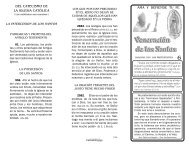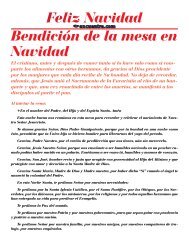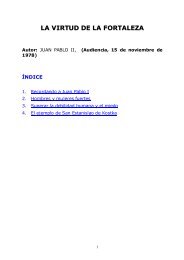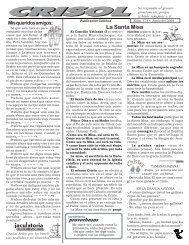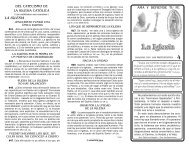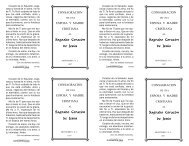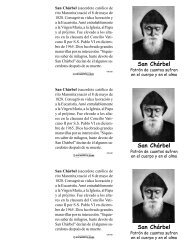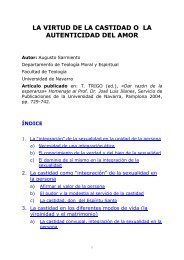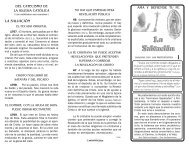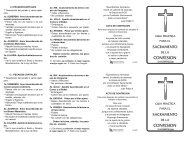La virtud de la prudencia según Tomás de Aquino - El que busca ...
La virtud de la prudencia según Tomás de Aquino - El que busca ...
La virtud de la prudencia según Tomás de Aquino - El que busca ...
You also want an ePaper? Increase the reach of your titles
YUMPU automatically turns print PDFs into web optimized ePapers that Google loves.
ciencia <strong>que</strong> se <strong>busca</strong> o teología. Es <strong>de</strong>cir, se trata <strong>de</strong>l saber <strong>que</strong> permite el<br />
hábito <strong>de</strong> sabiduría, no el <strong>de</strong>l hábito <strong>de</strong> pru<strong>de</strong>ncia.<br />
168 In I Sententiarum, d. 39, q. 2, a. 2, co. Un texto paralelo al citado en <strong>la</strong> nota<br />
prece<strong>de</strong>nte dice así: “en <strong>la</strong> provi<strong>de</strong>ncia <strong>de</strong>ben ser consi<strong>de</strong>radas dos cosas: a<br />
saber, <strong>la</strong> disposición, y <strong>la</strong> ejecución <strong>de</strong> <strong>la</strong> disposición: en <strong>la</strong>s cuales se<br />
encuentra en cierto modo diversa razón <strong>de</strong> perfección. Pues en <strong>la</strong> disposición<br />
<strong>la</strong> provi<strong>de</strong>ncia es tanto más perfecta cuanto el provi<strong>de</strong>nte más pue<strong>de</strong><br />
consi<strong>de</strong>rar y or<strong>de</strong>nar con su mente <strong>la</strong>s cosas singu<strong>la</strong>res: <strong>de</strong> don<strong>de</strong> todas <strong>la</strong>s<br />
artes operativas tanto más perfectas resultan cuanto alguien pue<strong>de</strong><br />
pronosticar más <strong>la</strong>s cosas singu<strong>la</strong>res. Pero en cuanto a <strong>la</strong> ejecución <strong>la</strong><br />
provi<strong>de</strong>ncia es tanto más perfecta cuanto el provi<strong>de</strong>nte mueve por muchos<br />
medios e instrumentos obrando más universalmente”, De Substantiis<br />
Separatis, cap. 15/77.<br />
169 Summa Theologiae, I ps., q. 103, a. 4, sc. Texto paralelo al <strong>de</strong> In I<br />
Sententiarum, d. 35, q. 1, a. 5, ex. Y en otros pasajes se dice: “provi<strong>de</strong>ntia<br />
est simul cum ars gubernationis rerum”, In I Sententiarum, d. 40, q. 1, a. 2,<br />
co; “gubernatio est provi<strong>de</strong>ntia effectus”, Q. D. De Veritate, q. 5, a. 1, sc 7;<br />
“ad provi<strong>de</strong>ntiam autem gubernantis pertinet perfecctionem in rebus<br />
gobernatis servare, non autem eam minuire”, Summa Contra Gentiles, l. III,<br />
cap. 71, n. 3; “provi<strong>de</strong>ntia, quae est ratio gubernationis”, Summa<br />
Theologiae, I ps., q. 103, a. 6, ad 1.<br />
170 “Regere autem provi<strong>de</strong>ntiae actus est”, In IV Sententiarum, d. 49, q. 1, a. 2,<br />
e, co.<br />
171 Q. D. De Veritate, q. 24, a. 12, co.<br />
172 Summa Theologiae, I ps., q. 103, a. 6, co.<br />
173 In I Sententiarum, d. 39, q. 2, a. 1, co.<br />
174 Q. D. De Veritate, q. 5, a. 1, ad 9.<br />
175 “<strong>La</strong> provi<strong>de</strong>ncia incluye <strong>la</strong> razón <strong>de</strong> disposición y aña<strong>de</strong>. Y por esto, también<br />
se dice <strong>que</strong> se dispone por <strong>la</strong> provi<strong>de</strong>ncia”, In I Sententiarum, d. 40, q. 1, a.<br />
2, co.<br />
176 “En cualquier disposición <strong>de</strong> <strong>la</strong> provi<strong>de</strong>ncia <strong>la</strong> misma or<strong>de</strong>nació <strong>de</strong>l efecto<br />
<strong>de</strong>riva <strong>de</strong> <strong>la</strong> forma <strong>de</strong>l agente”, Summa Contra Gentiles, l. III, cap. 80, n. 4.<br />
177 Summa Theologiae, I ps., q. 22, a. 2, ad 3.<br />
178 Q. D. De Veritate, q. 6, a. 1 co. Y en otros pasajes: “ad pru<strong>de</strong>ntia pertinet<br />
provi<strong>de</strong>ntia <strong>de</strong>bita futurorum”, Summa Theologiae, II-II ps, q. 55, a. 7, ad 2;<br />
“provi<strong>de</strong>ntia est futurorum”, Ibi<strong>de</strong>m, q. 10, a. 2, sc. 4; “provi<strong>de</strong>ntia est<br />
praevisio rerum fiendarum in futuro”, In Psalmos, 15, n. 6.<br />
179 Summa Theologiae, III ps., q. 11, a. 1, ad 3.<br />
180 Q. D. De Veritate, q. 6, a. 1, co.<br />
181 Summa Theologiae, II-II ps., q. 49, a. 6, co.<br />
182 Q. D. De Veritate, q. 8, a. 12, ad 5. Y en otra parte: “<strong>según</strong> Boecio se dice<br />
mejor provi<strong>de</strong>ncia <strong>que</strong> praevi<strong>de</strong>ncia, ya <strong>que</strong> no ves todas <strong>la</strong>s cosas como<br />
futuro, sino <strong>de</strong> lejos en presente con un golpe <strong>de</strong> vista intuitivo”, In I<br />
62



